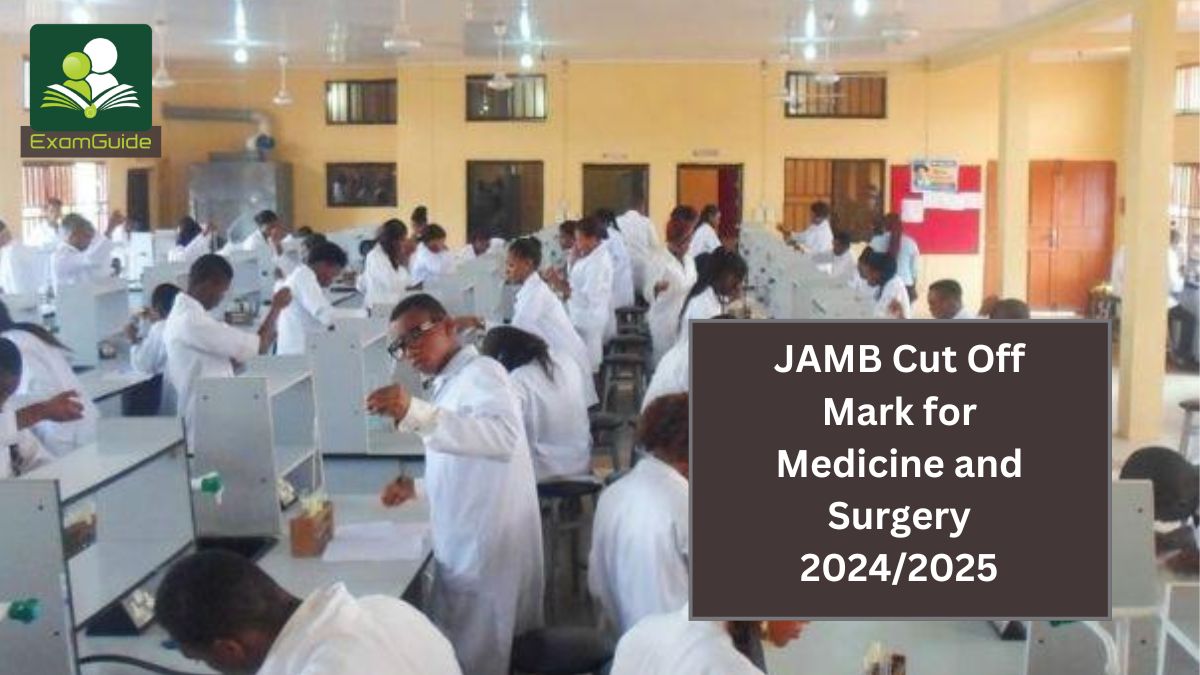
JAMB Cut Off Mark for Medicine and Surgery 2024/2025
The Joint Admissions and Matriculation Board (JAMB) sets a minimum score required for admission into Nigerian universities, known as the cut-off mark. This score varies based on the course and the university.
The cut-off mark is significantly higher for Medicine and Surgery, one of the most competitive courses.
This article provides an in-depth look at the JAMB cut-off mark for Medicine and Surgery, along with insights into the admission process and tips for securing a spot in this competitive field.
Table of Content
What is the JAMB Cut-Off Mark?
What is the JAMB cut-off mark for Medicine and Surgery for the 2024/2025 academic session?
Factors Influencing the Cut-Off Mark
Why is the cut-off mark for Medicine and Surgery so high?
How can I increase my chances of meeting the cut-off mark for Medicine and Surgery?
What should I do if I don’t meet the cut-off mark for Medicine and Surgery?
How do I apply for Medicine and Surgery once I meet the cut-off mark?
What is the JAMB Cut-Off Mark?
The JAMB cut-off mark is the minimum score required for admission into a particular course at a Nigerian university. It is determined based on the aggregate performance of candidates in the Unified Tertiary Matriculation Examination (UTME), conducted by JAMB.
Each university sets its own cut-off mark for various programs, including Medicine and Surgery, which is one of the most competitive courses due to its high demand and rigorous entry requirements.
What is the JAMB cut-off mark for Medicine and Surgery for the 2024/2025 academic session?
For the 2024/2025 academic session, the JAMB cut-off mark for Medicine and Surgery typically ranges from 250 to 300, depending on the university. Below is a general overview of what to expect:
- Top-Tier Universities: Leading institutions like the University of Ibadan (UI), University of Lagos (UNILAG), and Obafemi Awolowo University (OAU) often set higher cut-off marks, ranging between 270 and 290. These universities are known for their rigorous admission standards and high competition for spots in the Medicine and Surgery programs.
- Mid-Tier Universities: Universities such as the University of Nigeria, Nsukka (UNN) and Ahmadu Bello University (ABU) may have cut-off marks ranging from 250 to 270. While still competitive, these institutions may offer slightly lower cut-off marks compared to the top-tier universities.
- State and Private Universities: State and private universities may have varying cut-off marks, often lower than those of federal universities. The cut-off marks can range from 250 to 270, depending on the university’s policies and the number of applicants.
Factors Influencing the Cut-Off Mark
Several factors influence the JAMB cut-off mark for Medicine and Surgery:
- Number of Applicants: The volume of students applying for Medicine and Surgery affects the cut-off mark. Higher competition generally leads to higher cut-off scores.
- Performance Trends: The average performance of candidates in the UTME can impact the cut-off mark. If many candidates achieve high scores, universities may raise the cut-off mark.
- University Policies: Each university has its admission policies and may adjust the cut-off mark based on its capacity and admission strategy.
- National Trends: Changes in national education policies and trends in the health sector can also influence cut-off marks.
Why is the cut-off mark for Medicine and Surgery so high?
The cut-off mark for Medicine and Surgery is particularly high due to several key factors:
- High Demand: Medicine and Surgery programs are highly sought after by students, leading to intense competition for admission. The high demand necessitates a higher cut-off mark to manage the number of applicants and ensure that only the most qualified students are admitted.
- Program Rigor: Medicine and Surgery are rigorous and demanding courses requiring high academic ability and preparedness. A high cut-off mark helps to ensure that candidates have the strong academic background necessary to succeed in these challenging programs.
- Limited Spaces: There are limited spaces available in medical schools compared to the number of applicants. To maintain quality and manage the limited number of spots, institutions set higher cut-off marks to select the top-performing candidates.
- Institutional Standards: Medical schools have stringent standards and requirements due to the complexity and importance of medical training. High cut-off marks reflect the need for candidates who meet these rigorous academic standards.
- Historical Trends: Historically, cut-off marks for Medicine and Surgery have been set high due to the program's competitive nature. This trend continues as institutions strive to admit the best candidates.
- National Policy: The Joint Admissions and Matriculation Board (JAMB) and individual universities may set higher cut-off marks for Medicine and Surgery to ensure that only highly qualified students are admitted into the program, aligning with national educational and professional standards.
How can I increase my chances of meeting the cut-off mark for Medicine and Surgery?
To increase your chances of meeting or exceeding the cut-off mark for Medicine and Surgery, consider the following steps:
- Aim for High UTME Scores: Aim to score above the minimum cut-off mark to improve your chances of admission. Focus on thorough preparation and practice for the UTME.
- Research University Requirements: Each university may have specific admission requirements beyond the JAMB cut-off mark, such as post-UTME screenings or additional qualifications. Research these requirements early.
- Prepare for Post-UTME: Many universities conduct a post-UTME or aptitude test. Prepare for these tests by studying past questions and understanding the test format.
- Seek Professional Guidance: Consult with educational advisors, mentors, or career counsellors who can guide you in preparing for the Medicine and Surgery program.
- Stay Updated: Regularly check the JAMB and university websites for updates on cut-off marks and admission procedures.
What other factors besides the JAMB cut-off mark are considered for admission into Medicine and Surgery?
Besides the JAMB cut-off mark, other factors considered for admission into Medicine and Surgery include:
- O'Level Results: Strong performance in relevant subjects (Biology, Chemistry, Physics, and Mathematics) is crucial.
- Post-UTME Screening: Many universities conduct additional tests or interviews that evaluate candidates' knowledge and suitability for the program.
- Academic Performance: Consistently high grades throughout secondary education can be beneficial.
- Recommendations: Strong letters of recommendation from teachers or professionals in the field can support your application.
- Interviews: Some institutions may require an interview to assess your commitment and aptitude for studying Medicine.
What should I do if I don’t meet the cut-off mark for Medicine and Surgery?
If you do not meet the cut-off mark, consider alternative pathways such as applying for related courses, exploring different universities with lower cut-off marks, or re-taking the UTME to achieve a higher score in the following year.
How do I apply for Medicine and Surgery once I meet the cut-off mark?
Once you meet the cut-off mark for Medicine and Surgery, follow these steps to apply:
- Check University Requirements: Verify the specific application requirements and deadlines for the universities you're interested in. Each institution may have different procedures.
- Obtain Application Forms: Visit the official website of the university or the admissions office to download or request the application form. Some universities also offer online application systems.
- Complete the Application Form: Fill out the application form accurately, providing all required information. This typically includes personal details, academic records, and any additional documents requested.
- Prepare Supporting Documents: Gather and prepare necessary documents, which may include:
- JAMB result slip
- O'Level results
- Birth certificate
- Passport-sized photographs
- Proof of payment for the application fee (if applicable)
- Submit the Application: Follow the submission guidelines provided by the university. This might involve submitting the application online or physically delivering it to the admissions office.
- Attend Post-UTME Screening: If the university conducts a post-UTME screening, ensure you attend and perform well. This is an additional assessment beyond the JAMB score.
- Prepare for Interviews: Some universities may conduct interviews as part of their selection process. Prepare by researching common interview questions and reviewing your motivation for studying Medicine and Surgery.
- Await Admission Decision: After submitting your application and completing all required steps, wait for the university to review applications and release admission lists.
- Accept Admission Offer: If you receive an admission offer, follow the instructions to accept and complete any additional steps, such as paying acceptance fees or registering for the program.
Frequently Asked Questions
Can I study Medicine and Surgery with 200 in JAMB?
Securing admission to study Medicine and Surgery with a JAMB score of 200 is highly unlikely.
While it's possible that some private universities or institutions with lower cut-off marks might consider you, the competition for Medicine and Surgery is extremely stiff. Most reputable public universities in Nigeria have significantly higher cut-off marks for this course.
It's essential to aim for a much higher score to increase your chances of gaining admission into a good medical school.
Which university is the best for a medical student in Nigeria?
The University of Ibadan is Often regarded as the premier medical school in Nigeria, known for its rich history and strong academic program.
How many years to study Medicine in Nigeria?
It takes 6-7 years to study Medicine and Surgery in Nigeria.
What is the best jamb score for Medicine and Surgery?
A JAMB score of 300 and above is generally considered excellent for Medicine and Surgery.
However, it's essential to remember that admission also depends on your performance in the post-UTME exam and other admission criteria set by the university.
Conclusion
The JAMB cut-off mark for Medicine and Surgery in the 2024/2025 academic session is a key factor in the admission process. Understanding the cut-off mark and preparing accordingly can greatly enhance your chances of securing a spot in this competitive field.
By aiming for high UTME scores, researching university requirements, and staying informed about admission procedures, you can improve your prospects of studying Medicine and Surgery in Nigeria.
No comment found
Related Posts

How to Access JAMB Inter-Programme Transfer, Deletion, and Results Certificate Upload Services | Portal Activated

2025 Lists of All JAMB Accredited Professional Testing Centres (PTC) and Professional Registration Centres (PRC) in Nigeria.

JAMB NEWS: Court Stops JAMB from Restricting Underage Students (2024 UPDATE)

JAMB New Age Policy: Schools can now Admit Candidates Turning 16 by August 2025.

JAMB Cut-off Mark for Electrical and Electronics Engineering in 2024/2025


